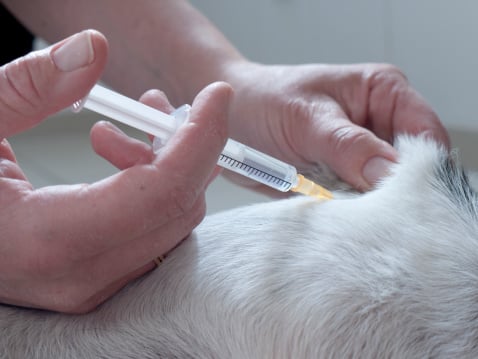Key Takeaways
- Addison’s disease is an endocrine system disorder caused by hormonal imbalance.
- Symptoms include vomiting, diarrhea, increased thirst, and fatigue.
- Undiagnosed Addison’s disease can be fatal.
- Treatment may involve hormone replacement therapy and corticosteroid injections.
- Stress-relief, lifestyle changes can help dogs manage Addison’s disease.
Diagnosing a dog’s mysterious medical condition can be as difficult as an episode of doggie House M.D. (Dog House D.V.M?) Pets can’t tell us when they’re in pain, and even when we can read the signs right – excessive whining, lethargy, loss of appetite – we don’t know exactly what hurts. Even diagnostic tests can only reveal so much and may not be conclusive.
Addison’s disease in dogs is one of these evasive conditions, marked by its inconsistent symptoms that can culminate in a life-threatening Addisonian crisis if left untreated. If your pet has seemed a little off but you can’t put your finger on the issue, it may be time to make an appointment with your vet.
What is Addison’s Disease?
Also known as hypoadrenocorticism or adrenal insufficiency, Addison’s disease in dogs is a disorder of the endocrine system. At its core, the condition is caused by a hormone imbalance. Dysfunction of the adrenal gland is the primary cause; these organs cap the kidneys anatomically and produce hormones that are essential to bodily functioning. Cortisol is one of these hormones, its most important function being to regulate the body’s response to stress. Blood sugar levels are also disrupted, and electrolyte imbalances can lead to dehydration and fatal heart rhythm abnormalities.
Symptoms of Addison’s Disease in Dogs

The root cause of Addison’s disease in dogs isn’t definitively known, but middle-aged female dogs have been found to be most at risk. Great Danes, Rottweilers, Poodles, and Wheaten terriers are some dog breeds that may have a higher incidence of canine Addison’s disease. Onset of the condition can be sudden and severe, with symptoms appearing intermittently:
- Vomiting and diarrhea
- Depression and fatigue
- Loss of appetite
- Increased thirst and urination
Indeterminate and disappearing symptoms like these can make canine Addison’s disease difficult to diagnose. Secondary symptoms related to high stress levels can also occur, such as fur loss, excessive grooming, and lethargy. Pay close attention to your pet’s behavior and habits, noting any changes. According to the Washington State University College of Veterinary Medicine, the average age at development of Addison’s disease in dogs is four years old.
Diagnosis and Treatment of Canine Addison’s Disease
Many undiagnosed cases of Addison’s disease culminate in an Addisonian crisis, which can be fatal if left untreated. A vet will determine if a dog has the condition by taking vital signs and blood work, looking for indicators like cardiac arrhythmias (abnormal heart rhythm) and high potassium. Emergency treatment for Addison’s disease in dogs involves stabilizing the animal through rehydration, cortisol-replacement medications, and other drugs to counteract the effects of hyperkalemia (excessive potassium). Prolonged hospitalization may be required until your pet’s electrolytes have stabilized.

If you visit the vet during a non-emergent episode, a diagnostic ACTH (adrenocorticotropic hormone) stimulation test may be undertaken. Measuring levels of cortisol in the pet’s blood before and after an ACTH injection can often provide a definitive diagnosis; if Addison’s disease is present, the dog will show no increase in cortisol levels.
Long-term treatment of Addison’s disease in dogs primarily consists of hormone replacement therapy. Injections of corticosteroids are usually required to manage the condition and keep a pet healthy and happy. An oral medication is also available; talk to your vet about the best dosage and method of administration for your pet. Regular vet visits are required at first to measure your dog’s hormone and potassium levels, ensuring that they’re not dangerously elevated. When these levels become stable, monitoring visits will be less frequent (a few times a year).
How To Manage Addison’s Disease in Dogs

In addition to supplementary hormone treatment, Addison’s disease in dogs is managed with a number of lifestyle changes. Helping your pet live a stress-free life is essential, as the dysfunctional adrenal glands can’t respond at full-capacity to stressors. There are many ways to reduce stress in your dog’s life. Massage, acupuncture and aromatherapy are all holistic methods used to treat Addison’s disease in dogs, but consult your vet before seeking any alternative treatments. Environmental stressors, such as traffic noises, wild animals, and an active household can also affect high-strung pups, so reduce your dog’s exposure to these stressors.
Traveling outside your dog’s comfort zone can also strain a dog with Addison’s disease, so talk to your vet about increasing hormone dosage or even sedating your pet before flying with or boarding Fido. Finally, do your best to make your home a cozy, relaxing place for your pet; try an orthopedic dog bed, or a cozy crate pad if your pup is crate trained. With proper exercise and rest, Addison’s disease in dogs has little effect on quality of life.
A nutritious diet is a must! Pick a food designated for your pet’s life stage, or a prescription diet that is recommended by your vet.
Addison’s disease in dogs can be tricky to detect and diagnose, but it can be effectively managed with medications to help affected dogs have a good quality of life. If your middle-aged dog is seeming a little off, take them to your veterinarian for a thorough work-up.
Are you a Healthy Paws pet parent with a recovery story to tell? We’d love to hear it! Send your pet’s story along with photos of your four-legged family member to happytales@healthypaws.com.
The content is not intended to be a substitute for professional veterinarian advice, diagnosis, or treatment. Always seek the advice of your veterinarian or other qualified health provider with any questions you may have regarding a medical diagnosis, condition, or treatment options.









